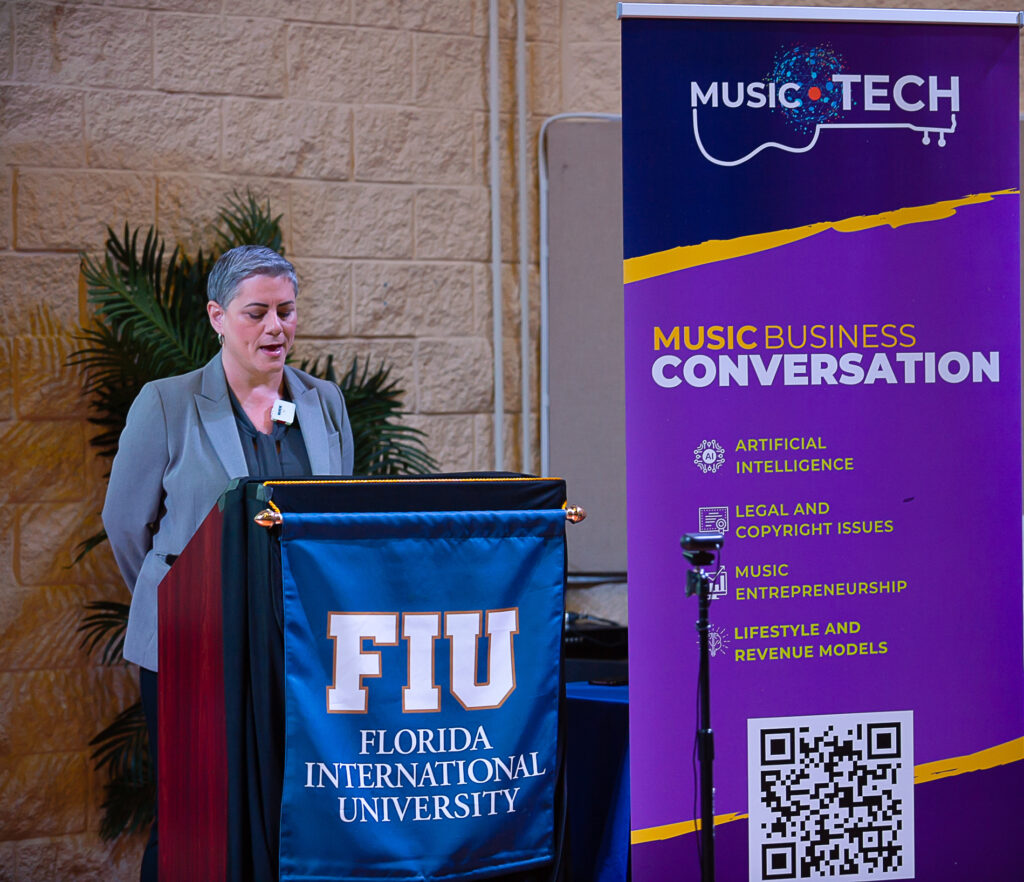
Music Business Conversation at Florida International University Explores the Potential and the Future of the Industry
During a recent morning at Florida International University’s Wertheim School of Music in the vibrant city of Miami, industry experts engaged in a dynamic conversation about the music business. The “Music Business Conversation” event hosted a diverse panel of professionals who shared their insights on the ever-changing landscape of music rights, artificial intelligence (AI), and the future of human-AI collaboration in the music industry.
The event began with an introduction by Mr. Jean Marie Altema, the founder of the music tech conference, who provided a visionary perspective on the future of music.” Today, we continue this exciting journey by bringing together a diverse group of individuals – students, professionals, business owners, musicians, and artists. Music Business Conversation facilitates collaboration, inspires creativity, and drives innovation. Although we don’t have all the answers, a constructive conversation integrating all stakeholders can illuminate the how, why, and why not.”, he added.
Dr. Karen S. Veloz, the director of the School of Music at FIU, delivered the welcome remarks. The event’s first panel discussed “Business Opportunities: Rights that Make Creating Value from Music Possible.” Dr. Veloz was joined by three panelists: Alexander Loveyko, an Intellectual Property and Entertainment Law Attorney at ChaseLawyers; Marsha C. Sealy, an Auditor and Specialist in the music business; and Michael Rucker, a Music Industry Executive and Entrepreneur. The panelists discussed the complex issue of music rights and their importance in enabling creators to generate value from their work. They highlighted various types of music rights, including copyright, mechanical licenses, synchronization licenses, and performance royalties. They emphasized the significance of these rights in ensuring fair compensation for artists and creators.
The discussion then revolved around the role of AI in the music industry. Dr. Mustafa Ocal, Assistant Professor of Music Business at FIU, delivered a keynote speech on “Coexistence of Humans and AI in the Future of the Music Business.” The speaker explored the potential of AI to revolutionize various aspects of creation. He highlighted the advantages of AI-powered tools, including their ability to process immense amounts of data and provide insights to guide decision-making. However, he also cautioned about ethical concerns on copyright issues.
The conversation then shifted to the legal implications of AI-generated music with a session titled “Balance Inventorship and Ownership in AI-Generated Music Patents.” Serona Elton, who is the Chair of the Music Industry Department of the University of Miami, and Albert DeCady, an Attorney at the US Patent and Trademark Office (USPTO), tackled the complex question of inventorship and ownership in the context of AI-created music, considering the contributions of human composers and AI algorithms. They discussed the legal frameworks governing patent protection for AI-generated inventions and the challenges of balancing the rights of creators with the advancement of AI technology.
Throughout the conversation, the panelists engaged in lively discussions, sharing their perspectives and experiences from the music industry. They highlighted the challenges and opportunities that lie ahead, emphasizing the need for continuous innovation and adaptation in the face of technological advancements and shifting consumer behaviors. The hybrid audience, composed of students, aspiring artists, and industry professionals, actively participated in the conversation, asking insightful questions and engaging with the panelists’ ideas.
The “Music Business Conversation” at FIU provided a valuable forum for exploring the critical issues shaping the future of the music industry. The event brought together diverse perspectives, fostering a deeper understanding of the opportunities and challenges ahead as music and technology intertwine. As the industry evolves, it is evident that the intersection of human creativity and AI will play a pivotal role in shaping the soundscapes and experiences that connect us to music.

